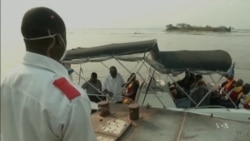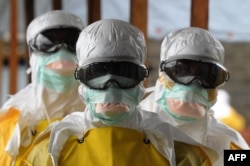A British nurse infected with Ebola has recovered and been released from a London hospital, even as health experts warn the virus' threat is growing in West Africa and requires a "massive" global response.
The Royal Free London Hospital said Wednesday that William Pooley was discharged after 10 days of treatment that included the experimental drug ZMapp. He was hospitalized there last month after contracting Ebola while working in Sierra Leone.
The world's worst outbreak of Ebola already has infected at least 3,000 people and killed more than 1,500 in Guinea, Liberia, Sierra Leone, Nigeria and Senegal.
Two health experts who've recently visited the region offered dire assessments and said combatting the disease would require a concerted global response, especially from wealthy countries.
"Six months into the worst Ebola epidemic in history, the world is losing the battle to contain it," Joanne Liu, president of the international charity Doctors Without Borders, told the United Nations in a briefing Tuesday. "Leaders are failing to come to grips with this transational threat."
Liu told the UN warned the deadly virus will not be stopped unless wealthy nations dispatch specialized biological disaster response teams to West Africa
Worsening situation predicted
The outbreak in West Africa will worsen "significantly" in coming weeks, predicted Tom Frieden, the head of the U.S. Centers for Disease Control and Prevention.
Speaking at CDC headquarters in Atlanta, Frieden praised the tremendous effort by health care workers but emphasized the urgency of the situation.
"There is a window of opportunity to tamp this down, but that window is closing," he said. "We need action now to scale up the response."
Frieden attributed Ebola's spread to "just two roots: people caring for other people in hospitals or homes and unsafe burial practices where people may come into contact with body fluids from somebody who’s died from Ebola.
"That is really the Achilles’ heel of this virus," he said. "We know how it spreads. We know how to stop it from spreading. The challenge is to do that everywhere it’s needed."
The CDC director called for a major inflow of resources, technical experts and a global, coordinated, unified approach. He pointed out the epidemic is not just an African problem, but a global problem.
Liu likewise called the virus a transnational threat.
"Riots are breaking out, isolation centers are overwhelmed, and health workers on the front lines are becoming infected and are dying in shocking numbers," she told the U.N. "Others have fled in fear leaving people without care for even the most common illnesses [and] entire health systems have crumbled."
Liu said isolation centers are now reduced to places where people go to die alone, where little more than palliative care is offered.
Obama's message of support
Before leaving for Europe, U.S. President Barack Obama videotaped a message to West Africa.
"On behalf of the American people, I want you to know that our prayers are with those of you who have lost loved ones during this terrible outbreak of Ebola," said Obama.
He sought to dispel myths surrounding Ebola's spread, saying infection only comes through contact with someone or something infected by the virus or the body fluids of someone who has died of Ebola. He said people can respect their burial traditions and honor their loved ones "without risking the lives of the living."
The president said stopping the disease will not be easy, but it can be done cooperatively.
Federal contract for drug
U.S. health officials Tuesday announced a federal contract with California-based Mapp Biopharmaceuticals to speed development of ZMapp, the experimental drug that has yet to go through extensive human testing but has been rushed into use despite its limited availability.
Two American missionaries working in Liberia who contracted Ebola were given the drug and have recovered from their illnesses. One of those health care workers, Kent Brantly, told NBC television Tuesday he was not sure he would survive.
"I don’t think they ever said, ‘Kent, you are about to die.’ But I felt like I was about to die," Brantly recalled.
Brantly, who has been released from Emory University Hospital in Atlanta, said he is in "tearful prayer" for yet another American doctor, identified only as a male obstetrician, who has contracted Ebola in Liberia. He has isolated himself since the symptoms appeared.
All three Americans, including Nancy Writebol, work for the North Carolina-based SIM International mission.








